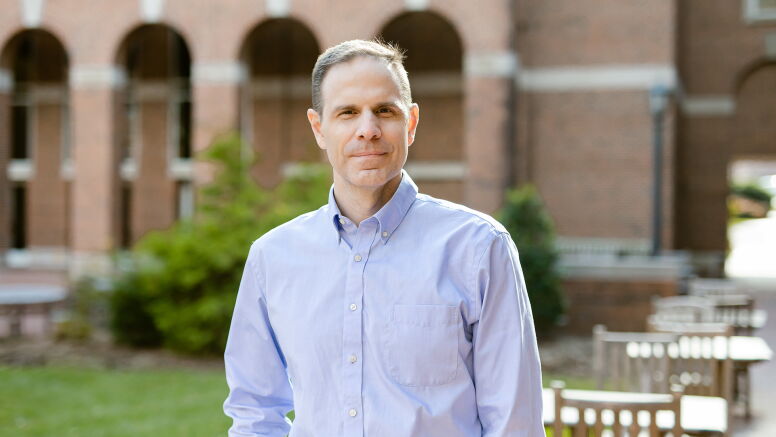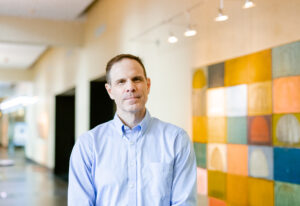News & Stories
Making teams work

People – of character and stature – drew Matthew Pearsall to join the faculty at UNC Kenan-Flagler Business School.
He was a professor at the University of Maryland when he ran into Michael Christian and Jessica Siegel Christian, who he knew from graduate school. They talked to him about a job opening at UNC Kenan-Flagler, where they are on the organizational behavior faculty, and the culture of the School.
“What I really liked was that there was this cohort of people who had just gotten there,” says Pearsall. “We had this core of people who have been here and developed together. We figured out things and have provided input into how the area has developed. Along with some of the senior faculty, we have had a cohesive group for a very long time.”
What has kept Pearsall on campus and committed to the job is the freedom to “teach the things I want to teach the way I want to teach them.” He appreciates the ability to pursue fascinating research, access the lab and conduct field work.
In addition, Pearsall feels connected to industry because of the opportunities he has to work with executives and the government.
“There are a lot of different ways you can make a difference here,” he says. “It’s really hard to find something that’s missing that would encourage me to go looking elsewhere.”
A new kind of leader
Pearsall’s road to becoming a professor was a winding one. To start, he served as a lieutenant in the U.S. Navy, which left a lasting impression on him.
 “The power you have in a military organization over your subordinates is extraordinary,” says Pearsall. “And it’s round the clock. Anything that happens in their life, you’re involved in it. They bounced a check. They got ripped off by a used car dealer. You’re involved.”
“The power you have in a military organization over your subordinates is extraordinary,” says Pearsall. “And it’s round the clock. Anything that happens in their life, you’re involved in it. They bounced a check. They got ripped off by a used car dealer. You’re involved.”
Pearsall weaves idea of empathetic leadership into his courses. He primarily teaches in the Full-Time MBA Program and is part of the team of professors teaching the core leadership course. Pearsall helps coordinate the first classes for incoming full-time MBA students that focus on inclusive leadership, structured problem solving, leadership and professional presence.
In addition to teaching about leading change and motivating people, Pearsall teaches negotiations. Rounding out Pearsall’s teaching schedule are classes in UNC Executive development and PhD seminars.
Hands-on learning
The highlights of Pearsall’s classes include experiential learning opportunities and dynamic conversations.
“I learned a long time ago that the less I talk, the better the class goes,” says Pearsall. “The more they talk, the more they experience.”
Pearsall’s position is that people retain more of what they learn if they have the chance to apply it and make mistakes. Often, people think they do something well or get stuck doing things a certain way because they have always done them that way. Pearsall wants them to shake things up.
“I try to get them out of their comfort zone, open their minds to the idea that, ‘Hey, there’s something to learn here,’” says Pearsall. “Then, I give them an experience, where they can apply that, see how it works, feel more confident about it. Then, they’re really listening.”
Understanding effective teams and leaders
Beyond teaching, Pearsall is focused on research related to teams and leadership. He often partners with Jessica Siegel Christian, clinical associate professor of organizational behavior, and doctoral students. The research is unique because it often looks at leadership through the lens of teams rather than individuals.
 For instance, Pearsall and his colleagues looked at empowering leaders versus directive leaders. Empowering leaders give teams the chance to figure things out for themselves and make mistakes along the way, whereas directive leaders are more controlling and tell people what to do. Initially, teams led by an empowering leader fare worse. They pay a price for those mistakes. In the long run, however, they are equipped to solve problems on their own, and they can even help the leader if he or she makes an error.
For instance, Pearsall and his colleagues looked at empowering leaders versus directive leaders. Empowering leaders give teams the chance to figure things out for themselves and make mistakes along the way, whereas directive leaders are more controlling and tell people what to do. Initially, teams led by an empowering leader fare worse. They pay a price for those mistakes. In the long run, however, they are equipped to solve problems on their own, and they can even help the leader if he or she makes an error.
On the other hand, directive leaders have short-term success because they are stepping in with their experience to avoid anyone making a mistake. Later on, however, the team can’t adapt and problem solve on its own. The takeaway from this research is that empowering leaders will eventually have more success, but directive leaders can be more effective if there’s a fire to put out when a team is newly established.
In another simulation, Pearsall and his co-researchers looked at what happens when leaders focus on preventing problems. They looked at harmful overruling, when leaders overrule the team even though it is correct.
“It’s something that doesn’t really get studied,” says Pearsall. “We usually look at the leader as an independent decision maker or the leader purely as somebody who affects the followers, not how the leader directly affects the followers by his or her own actions, interfering with their performance.”
The research team has also considered the consequences of maternity leave. Research led by one of their students found that mothers return to work could be an opportunity for employers and employees to improve their relationship. The way leaders handle mother’s leave and return could mitigate any negatives and help her feel better about being among colleagues again.
A fresh approach
Research and teaching are not all that’s on Pearsall’s to-do list. He also provides service to UNC Kenan-Flagler. He is a PhD coordinator for the organizational behavior area, which means he provides feedback, gets involved in PhD selection, advocates for students and helps coordinate the program.
 His dedication has been recognized by his students. He won the Teaching All-Star for MBA Core Course in 2016, 2017, 2018, 2019 and 2020, and the Teaching All-Star for Negotiations in 2018, 2019, 2020 and 2022 in the Full-Time MBA Program.
His dedication has been recognized by his students. He won the Teaching All-Star for MBA Core Course in 2016, 2017, 2018, 2019 and 2020, and the Teaching All-Star for Negotiations in 2018, 2019, 2020 and 2022 in the Full-Time MBA Program.
Pearsall didn’t always want to be a professor. In fact, after serving in the U.S. Navy, he worked in industry at Waterhouse Securities as a stockbroker; at Sybase, Inc. as a financial analyst; and at Ericsson Wireless Systems as a senior analyst.
Academia provided flexibility and the opportunity to continue to learn new things.
This desire to pursue the fresh and new carries over into his hobbies as well. Pearsall recently learned to play the guitar to keep things interesting. Now that his children are older, he enjoys “guilty pleasure” reading – books different from the dense reading he does for his work.
“This job does give me opportunities to learn new things all the time,” says Pearsall, “I try new areas of study, take on new responsibilities.”